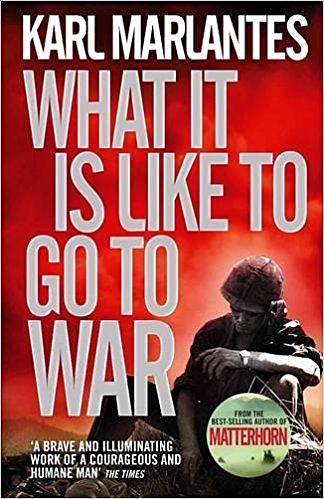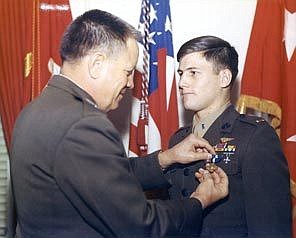The Northwest's Own Karl Marlantes
November 1, 2017 at 7:52 p.m.
This bestselling author and war hero was featured in the Ken Burns / Lynn Novick documentary, "The Vietnam War," which aired earlier this fall on PBS
In 1968, at the age of twenty-three, Karl Marlantes was dropped into the highland jungle of Vietnam, an inexperienced lieutenant in command of a platoon of forty Marines who would live or die by his decisions.
Marlantes was a bright young man— well-trained for the task at hand but far from mentally prepared for what lay ahead. He saw intense combat in his thirteen month tour; he killed the enemy and he watched friends die. Marlantes survived, but like many of his brothers-in-arms, he has spent over forty years trying to deal with his past.
The 72-year-old, who lives amongst the evergreens between Woodinville and Duvall, is one of 100 witnesses featured in the recent 10-part PBS documentary, The Vietnam War, by Ken Burns and Lynn Novick. Marlantes has also appeared onstage with Burns and Novick to discuss the film and his experiences in Vietnam.
In one way, Karl Marlantes was wellprepared to talk about Vietnam since he is the bestselling author of two books on the subject. His first book, the novel Matterhorn, is based on his own combat experiences in Vietnam. Matterhorn was hailed as an instant classic of war literature, although it took Marlantes over 30 years to write and he received at least 30 or 40 rejections before it was published. Sebastian Junger of The New York Times called Matterhorn "one of the most profound and devastating novels ever to come out of Vietnam—or any war."
In his second book, the nonfiction What It Is Like to Go to War, Marlantes takes a deeply personal and candid look at the experience and ordeal of combat—an intellectual examination of how we might better prepare our young soldiers for war. Marlantes says his purpose in writing the book was to provide other veterans with a roadmap for finding closure for their wartime experiences. While Marlantes possesses the personal experience and scholarship to examine the Vietnam War, actually discussing it was something else entirely. He explains his difficulty in the Ken Burns documentary: “For years, nobody talked about Vietnam. It was so divisive. It’s like living in a family with an alcoholic father: ‘Shhh! We don’t talk about that.’ Our country did that with Vietnam, and it’s only been very recently that the baby boomers are finally starting to say, ‘What happened? What happened?’ "
In an interview with the Seattle Times' Nicole Brodeur, Marlantes discussed his struggles opening up about his past. It took him six months of meeting with Ken Burns and Lynn Novick before he could begin to be comfortable speaking in front of the camera: “...when you’re talking about what you did in the war, I mean … you start trembling. You’ve got to trust these people. I don’t think I could have talked about it before now.”
Northwest Roots
Karl Marlantes grew up in Seaside. After publication of his books, Jeff Baker of the Oregonian delved into Marlantes' life to honor Oregon's native son.
Marlantes is "the son of a father who was born above a restaurant and a mother who grew up in a logging camp in Washington." His dad was a high school teacher turned principal; his mom waited tables and worked as a bookkeeper. "One of Marlantes' grandfathers was a gill-netter who lost a leg in a logging accident, and Karl and his brother worked for him as boat pullers, hauling the heavy net filled with fish back into the boat," writes Baker. "It's a world gone by, a time within living memory that already has passed...the culture has changed over three generations. When Marlantes' father and his uncles fought in World War II, everyone understood where they were going and why. The understanding continued into the next generation, and as Marlantes was graduating from Seaside High School as the Vietnam War was escalating, he knew he might have to go."
Marlantes was a gifted student. He is described as a piano prodigy, a football star and a National Merit Scholar. Honoring his family's pride in serving the country, he had joined the Marines before leaving Seaside for Yale University. He later walked away from a Rhodes Scholarship at Oxford University for active duty in the Marines. He said that he could no longer hide behind privilege, couldn't sit on the fence when so many of his friends were fighting and dying while he "drank beer and debated at a beautiful university in England."
But his idealism was shattered in Vietnam. "Marlantes came back from a year in Vietnam wrecked physically and emotionally, unable to talk about what he'd seen and done," wrote Baker. "He repressed everything, except on paper." Marlantes considered the resulting 1,700- page novel (the basis for his blockbuster book, Matterhorn), as therapy for himself and no one else. Fast forward 30 years, and the accolades Matterhorn received was 'the feel-good publishing story of 2010'—a successful 66-year-old businessman and father of five with no experience or track record as a writer spent more than 30 years on a novel and finally saw it published to universal acclaim, wrote Baker.
Those thirty years were rough ones for Marlantes. He had won the Navy Cross, Commendations for Valor, two Purple Hearts and ten Air Medals. But his body was a wreck, covered with scars from jungle rot and shrapnel. And once back home, like many Vietnam vets, he did not experience a hero's welcome due to the fractured home front—a nation at war with itself over Vietnam. Marlantes stuffed his medals into a jelly jar in his basement and tried to put the past behind him.
Marlantes described this time in his life during a CNN interview with John Blake. When his wife became pregnant with their first son, Marlantes arranged for a midwife to deliver the baby in a cabin in the woods; he kept his child's name off the birth certificate for six months because he didn't want his son to be eligible for the draft. "I was so angry at the government...I was a little bit out of my mind."
And he was always on the move, taking his family around the world. They lived in a house boat in India, a tent on an army base in the Himalayas, a meadow in England, a sky rise hotel in Singapore and a vineyard in France. His daughter, Laurel, described their life as fun, but chaotic.
On the outside, Marlantes' life seemed ideal. He was an Ivy-Leaguer and war hero. He had a big income as an international energy consultant and a seemingly happy family life. But, as CNN's John Blake reports, "there was hardly a day when he wasn't thinking about the secrets he left in Vietnam."
Marlantes would sometimes lash out in fits of rage or bolt from sudden noises. Despite his success, work was a struggle. He was trying to stuff the memories back into his subconscious "I'm rolling around sweating at night, having nightmares and scaring my wife to death. Because you can't repress it without bad consequences," he said.
Ultimately, his marriage failed. Although he was unaware of it, Marlantes was suffering from severe post-traumatic stress.
"You have to deal with the fact that human life was destroyed and you're the one who pulled the trigger," said Marlantes. He eventually received help from the Veterans Administration through counseling and medication... and through writing.
A pivotal healing moment for Marlantes occurred after a Catholic priest held a private mass on his behalf, and on behalf of all those who were harmed. After 30 years, Marlantes revealed to John Blake, it felt like a stone had been rolled away from the entrance to his heart. He'd finally told a stranger what was going on inside of him and he didn't feel so alone anymore.
Karl Marlantes has remarried. He has reconnected with some of his fellow Marines from Vietnam. And those medals he once hid in a jelly jar are now on display at home.
Karl Marlantes' books are available at bookstores and on Amazon.com. Information on how to view "The Vietnam War" by Ken Burns and Lynn Novick can be found at www. pbs.org/kenburns/the-vietnam-war








